Today, people are accustomed to convenient telecommunications technology, but behind the convenience are the strenuous efforts of numerous companies, technicians, experts and scholars. One of them is Drazen Lukic, Executive Deputy General Manager of Nokia Shanghai Bell responsible for Nokia’s end-to-end IP/Optical business in Greater China. Born in Croatia, he is now a New Zealander. Having been to many places in countries like Italy, Australia, New Zealand and China, he has a special liking for Shanghai, where he has lived for 11 years.
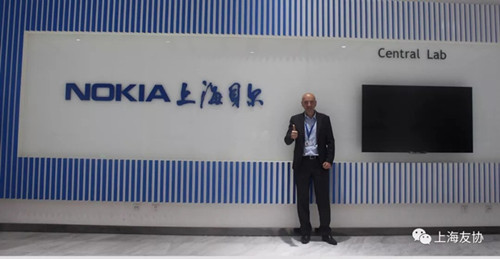
(Drazen Lukic poses for a photo in front of the company logo of Nokia Shanghai Bell.)
Drazen’s company is located in the Jinqiao Development Zone in Pudong New Area. Approved by the State Council in 1990, the national economic and technology development zone is home to many multinational companies. Nokia Shanghai Bell is the only joint venture under the direct supervision of the State-owned Assets Supervision and Administration Commission of the State Council. With more than 15,000 employees, the company has a domestic sales and service network covering 31 provinces, autonomous regions and municipalities, and a business footprint in more than 50 countries and regions. Its main business is to deliver end-to-end telecommunications solutions and services for operators and non-operators. It has strong R&D capabilities and expertise in mobile networks, fixed networks, IP networks, optical networks, software applications, 5G, the Internet of Things, and cloud computing.

(Jinqiao Development Zone)
A sport lover with an engineering background, the reporter’s first impressions of Drazen Lukic are that he is always energetic and passionate. Entering Drazen’s office, we saw an AC Milan jersey on his chair. He fell in love with this soccer team while working in Italy, and bought a customized jersey with his name on it.
A graduate in electrical engineering from the University of Zagreb, he was an outstanding technical expert before coming to China. In 2002, Nokia Corporation decided to establish a team in Shanghai in order to enter mainland China and the entire APAC market. Working in China is a huge challenge as the work here is intense and fast-paced. After comprehensive considerations, the corporation finally delivered the task to Drazen who had shown strong business capabilities and no fear of challenges.
According to Drazen, when he was born, Yugoslavia was still intact and was still a socialist country like China, the two countries enjoying a historically friendly relationship. That’s why he feels close to China. While working in New Zealand, he got an opportunity to go to Taiwan. His experiences in Taiwan led him to discover that the actual situation in China was different from what he had read in newspapers and books. In 2002, thanks to his company’s development strategy, he took a flight to Shanghai, with a friendly and curious heart.
After coming to Shanghai, Drazen served as the Director of Optical Networks Product Management and Strategy, and VP of APAC Optical Networks Regional Business Center. With rich international work experience, he has actively promoted the corporation’s business in China and the transformation strategy of localizing the optical networks product line, making great contributions to the company's business performance and efficiency.
In 2009, Drazen was transferred to Italy. At that point, his company's market in APAC, especially China, was developing rapidly, and the entire corporation's business focus tilted toward China. Bringing his China experience back to the optical networks business headquarters in Italy, Drazen helped the company formulate a new R&D strategy, product positioning and overall development strategy for the Chinese market. In his industry, no one is more familiar with China than him.
In Shanghai, Drazen has worked with many Chinese colleagues. He told the reporter that when he was transferred back to Shanghai again in 2011, he was much impressed with the changes in the young R&D staff, compared with the conditions in 2002.
“The first time I came, I noticed that they just took notes, listened to the superiors and completed the tasks they were assigned. But when I came back, I found them to be more confident, and willing to join in the discussion. They even argue with each other sometimes,” said Drazen. In the telecommunications industry, technology updates fast, and new applications keep springing up. Faced with these challenges, the young staff often choose to figure out solutions rather than complaining. They respect different ideas and execute plans efficiently after discussion.
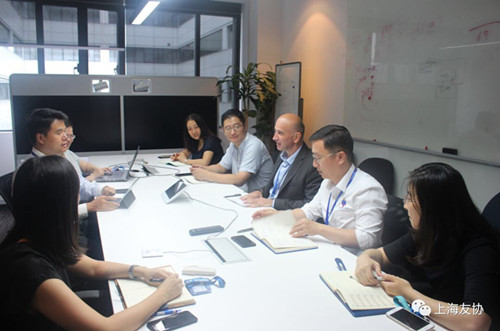
(Drazen Lukic in a meeting with his Chinese colleagues)
Between 2011 and 2016, while serving as VP of Optics APAC, by making use of his acumen for big data and high bandwidth broadband, Drazen saw to fruition a new generation of optical network products developed in the company’s Shanghai R&D center. Some of the examples are optical transport network (OTN) projects 1830 PSS-4, PSS-8 and PSS-16II. Thanks to the company’s design experience in optical network access, product integration, and technical reserves in the field of clock synchronization, 1830 PSS-8 and PSS-16II gained user recognition once they were rolled out in the market, not only in China, but also in APAC, Europe and North America.
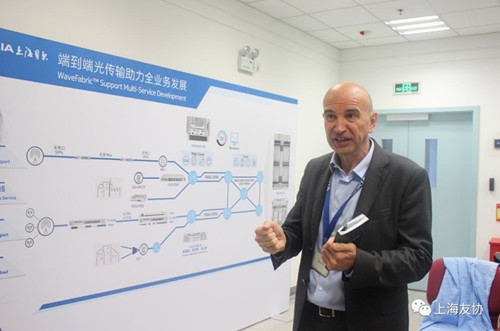
(Drazen introduces the central lab to his clients.)
Drazen is also a father of two daughters. He said, “The first time I came to Shanghai, my daughter came with me. Now I have a second daughter.” The second daughter was born in Shanghai and is now studying here. The family has been deeply integrated into the city.
As Drazen recalled, when he first visited Shanghai, construction was everywhere. The company also saw the golden age of large-scale promotion of the Internet in China. But now, as he put it, Shanghai's development has reached the stage of pursuing a high quality of life. He can easily feel the popularization of Shanghai’s service industry and the improvement of service quality. Development is more than simple infrastructure construction.
Since both his children are girls, security is a primary consideration for the Lukics. In Shanghai, they feel very at ease and don't have to worry about personal safety at all.
“In Shanghai, you can enjoy Chinese cuisine and food from all over the world. For example, in a supermarket, you can buy wines from all over the world very easily, which is not something that can be achieved in all major cities,” said Drazen when it comes to the convenience of living in Shanghai. “In terms of education, the quality of teaching at Shanghai’s international schools is excellent. My two children have access to different cultures there.” Every year, his daughters’ school holds a China Week. Kids spend one to two weeks in rural areas, seeing the farmers work in the fields, getting to know various crops, and experiencing the most unchanged aspects of Chinese culture. “In the village, the Chinese children teach my daughters kung fu, and my daughters teach them English,” said Drazen, who believes that all experiences in Shanghai will form a bond to attract them back here.
Since being appointed executive deputy GM of Nokia Shanghai Bell in 2016, Drazen has successfully turned the company into a global R&D center for the corporation’s optical network products.
During the 4G communications network construction in China, he led the industrialization of the 4G PTN packets in Shanghai and obtained more than ten core patents. As a result, the product line not only helped domestic operators achieve large-scale deployment, but appeared on overseas markets.
Thanks to his commitment to implementing China’s development guideline for promoting innovation-driven development and economic transformation, Nokia Shanghai Bell has realized end-to-end capability from R&D and advanced manufacturing, to marketing and after-sales service. In line with China’s national broadband strategy, Drazen’s company launched a number of innovative optical transmission products like the Wukong and Whiskey series, which were awarded the 2017 Shanghai Science and Technology Progress Award, thus securing a leading position in the company’s broadband access to counties, the next-generation 5G network construction and big data.
In response of the "going global" strategy and the Belt and Road Initiative, Drazen has led his company to cooperate with China’s general contracting EPC (Engineering, Procurement, Construction) companies, to expand the company’s operations to Tanzania, the Congo, the Philippines and Laos.
Under his leadership, despite some unfavorable factors and difficulties such as the APAC market slowdown, the company’s business team managed to explore new businesses, and achieved a rebound in the region of more than 35%. His IP and optical networks business team achieved double-digit growth in the Chinese mainland for two consecutive years (20% in 2017), with a 50% business growth in Hong Kong, Macao and Taiwan.
After being praised for his dedication to China’s telecommunications industry, he did not want to take the credit and said any technological progress cannot be driven by one company. That is the result of joint efforts of the entire industry, including all equipment vendors and operators.
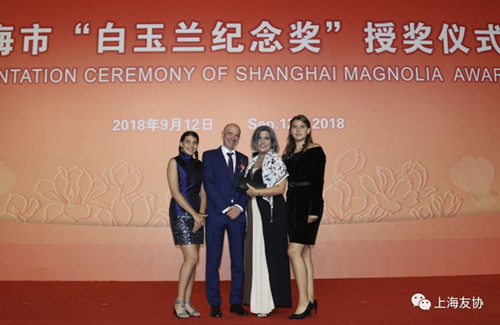
(Drazen and his family at the presentation ceremony of the Shanghai Magnolia Awards on September 12, 2018)
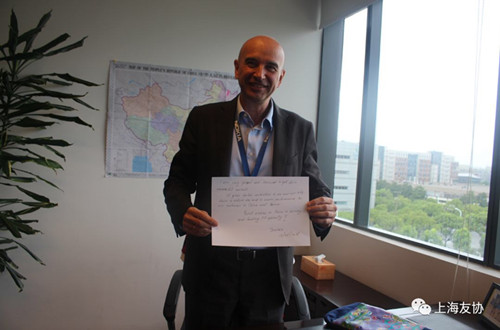
(Drazen writes down his feelings about receiving the Magnolia Silver Award: I am very proud and honored to get this wonderful award. It gives further motivation to me and our NSB team to deliver best-in-class performance for our customers in China. Best wishes to China in driving and leading 5G globally!)
Story by Fan Yicheng
Cameraman: Jia Haoyu
Translated by Wu Qiong
Special thanks to Shanghai Nokia Bell
